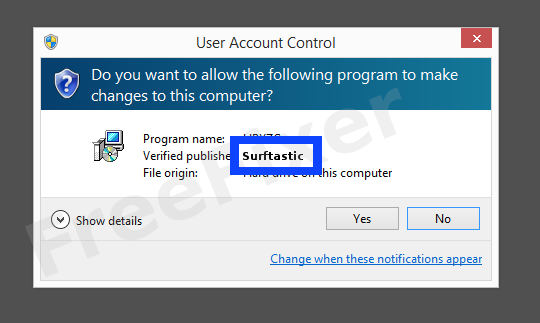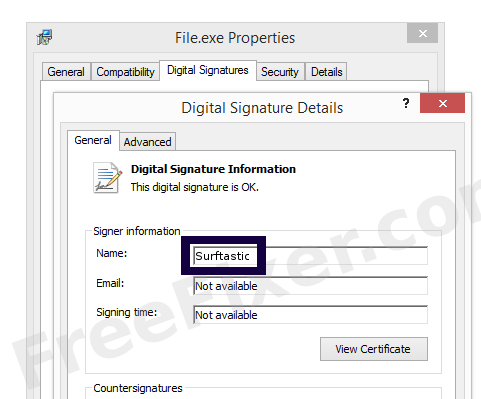Surftastic - 19% Detection Rate *
Did you just run into a download or a file on your computer that has a digital signature from Surftastic? Some of the security products refers to the detected files as PUP.Optional.Surftastic.A and Adware.NetFilter.E. The detection rate for the Surftastic files collected here is 19%. Please read on for more details.
You will probably see Surftastic when running the file. The publisher name shows up as the "Verified publisher" in the UAC dialog as the screenshot shows:

You can view the additional details from the Surftastic digital signature with the following procedure:
- Open Windows Explorer and locate the Surftastic file
- Right-click on the file and select Properties
- Click the Digital Signatures tab
- Click on the View Certificate button
Here's a screengrab of a file that has been digitally signed by Surftastic:

As you can see in the screenshot above, the Windows OS states that "This digital signature is OK". This means that the file has been published by Surftastic and that no one has tampered with the file.
If you click the View Certificate button shown in the screenshot above, you can view all the details of the certificate, such as when it was issued, who issued the certificate, how long it is valid, etc. You can also see the address for Surftastic, such as the street name, city and country.
VeriSign Class 3 Code Signing 2010 CA and COMODO Code Signing CA 2 has issued the Surftastic certificates. You can also view the details of the issuer by clicking the View Certificate button shown in the screenshot above.
Surftastic Files
The following are the Surftastic files I have collected, thanks to the FreeFixer users.
| Detection Ratio | File Name |
|---|---|
| 22/51 | Setup[1].exe |
| 14/55 | updateSurftastic.exe |
| 4/53 | wstlibg.sys |
| 2/52 | wstlib64.sys |
| 4/53 | utilSurftastic.exe |
| 4/52 | tmp7DE5.tmp |
| 6/53 | SurftasticBAApp.dll |
| 4/51 | {01531192-f7ef-415f-a549-cfdb11836731}w64.sys |
| 11/54 | {01531192-f7ef-415f-a549-cfdb11836731}w.sys |
| 10/55 | Surftastic.BrowserAdapter.dll |
| 10/54 | {01531192-f7ef-415f-a549-cfdb11836731}w.sys |
| 23/57 | wstlib64.sys |
| 17/50 | Setup[1].exe |
| 17/50 | Surftasticbho.dll |
| 17/50 | Surftasticbho.dll |
| 8/51 | updateSurftastic.exe |
| 6/53 | updateSurftastic.exe |
| 9/54 | Surftastic.Bromon.dll |
| 9/54 | {01531192-f7ef-415f-a549-cfdb11836731}w64.sys |
| 3/52 | {01531192-f7ef-415f-a549-cfdb11836731}w64.sys |
| 0/51 | wstlibg.sys |
| 0/51 | tstlibg.sys |
Scanner and Detection Names
Here's the detection names for the Surftastic files. I've grouped the detection names by each scanner engine. Thanks to VirusTotal for the scan results.
| Scanner | Detection Names |
|---|---|
| ALYac | Adware.NetFilter.E |
| AVG | Surfastic |
| AVware | Yontoo (fs), Trojan.Win32.Generic!BT |
| Ad-Aware | Adware.NetFilter.E |
| Agnitum | PUA.Agent!, PUA.Yotoon!, Trojan.BPlug! |
| AhnLab-V3 | Trojan/Win64.SwiftBrowse |
| Antiy-AVL | GrayWare[AdWare:not-a-virus]/Win32.Agent, GrayWare[AdWare:not-a-virus,HEUR]/MSIL.Kranet, Trojan/Win32.TSGeneric, AdWare/Win32.WebCake.gen |
| Avira | APPL/BrowseFox.Gen |
| Baidu-International | Adware.Win32.BrowseFox.BH, Hacktool.Win32.NetFilter.bA, Adware.Win32.BrowseFox.H, Adware.Win32.BrowseFox.I, Adware.Win32.BrowseFox.BI, Adware.Win32.BrowseFox.81, Adware.MSIL.BrowseFox.BG |
| BitDefender | Adware.NetFilter.E |
| CAT-QuickHeal | AdWare.Agent.ahbx (Not a Virus) |
| ClamAV | Win.Adware.Swiftbrowse-75 |
| Comodo | Application.Win32.Altbrowse.AK, UnclassifiedMalware |
| Cyren | W64/A-e967bae2!Eldorado |
| DrWeb | Trojan.BPlug.20, Trojan.BPlug.123, Trojan.BPlug.150, Trojan.BPlug.9, Trojan.BPlug.17, Trojan.BPlug.35, Trojan.BPlug.126 |
| ESET-NOD32 | a variant of Win32/BrowseFox.F, a variant of Win32/BrowseFox.H, Win32/RiskWare.NetFilter.A, a variant of Win32/BrowseFox.I, Win64/Riskware.NetFilter.A, probably a variant of MSIL/BrowseFox.G, Win32/BrowseFox.B, a variant of MSIL/BrowseFox.G |
| Emsisoft | Adware.NetFilter.E (B) |
| F-Prot | W64/A-e967bae2!Eldorado |
| F-Secure | Adware.NetFilter.E |
| Fortinet | Adware/Agent |
| GData | Adware.NetFilter.E |
| Ikarus | not-a-virus:AdWare.Win32.Agent, PUA.BrowseFox, AdWare.SpadeCast |
| Jiangmin | Adware/Agent.jgs, Adware/Agent.knw, AdWare/Yotoon.l, AdWare/Yotoon.m |
| K7AntiVirus | Trojan ( 00490ed91 ), Unwanted-Program ( 00454f261 ) |
| K7GW | Trojan ( 00490ed91 ), Unwanted-Program ( 00454f261 ) |
| Kaspersky | not-a-virus:AdWare.Win32.Agent.ahbx, not-a-virus:HEUR:AdWare.MSIL.Kranet.heur |
| Kingsoft | VIRUS_UNKNOWN, Win32.Troj.Generic.a.(kcloud), Win32.Troj.Agent.ah.(kcloud) |
| Malwarebytes | PUP.Optional.Surftastic.A |
| McAfee | Artemis!A06B7E297852, Artemis!40B5F6AC4EED, Artemis!A30B83BEBCFC, Artemis!72AA38CEAFC4, Artemis!FFFEC93F7F5F |
| McAfee-GW-Edition | Artemis!A30B83BEBCFC, Artemis!72AA38CEAFC4, Artemis!FFFEC93F7F5F |
| MicroWorld-eScan | Adware.NetFilter.E |
| NANO-Antivirus | Riskware.Win32.Agent.cqycvd, Riskware.Win32.Yotoon.ddghtt |
| Panda | Trj/Chgt.E |
| Qihoo-360 | Win32/Virus.Adware.e4c, HEUR/Malware.QVM23.Gen |
| Rising | NS:PUF.SilenceInstaller!1.9DDF |
| SUPERAntiSpyware | Adware.BrowseFox/Variant |
| Sophos | Generic PUA IB, Generic PUA OK, BrowseSmart, Generic PUA CL, Generic PUA OA, Generic PUA DD |
| Symantec | WS.Reputation.1, Yontoo.C |
| TrendMicro | HS_BROWSEFOX.SM |
| TrendMicro-HouseCall | TROJ_GE.E3BEBB0B, TROJ_GEN.F47V0513, TROJ_GEN.F47V0511, TROJ_GEN.F47V0519, HS_BROWSEFOX.SM, TROJ_GE.4137C418, TROJ_GEN.F47V0227, TROJ_GEN.F47V0329, TROJ_GEN.F47V0416, TROJ_GEN.F47V0514, Suspicious_GEN.F47V0702 |
| VBA32 | AdWare.Agent, AdWare.Win64.Yotoon |
| VIPRE | Adware.Agent, Yontoo (fs), Trojan.Win32.Generic!BT |
| Zillya | Adware.Yotoon.Win64.1 |
| nProtect | Adware.NetFilter.E |
* How the Detection Percentage is Calculated
The detection percentage is based on the fact that I have gathered 1735 scan results for the Surftastic files. 332 of these scan reports came up with some sort of detection. You can review the full details of the scan results by examining the files listed above.
Analysis Details
The analysis is based on certificates with the following serial numbers:
- 117c1c381ba3522c50659e614bb20d99
- 1e51b1bc1da0d725290be84dcf88d4eb
Comments
It’s always concerning to come across files with questionable digital signatures like Surftastic, especially when there’s a detection rate involved. I appreciate the detailed breakdown of the certificates and the scan results here—it really helps to understand the risks involved with these types of files. I’ve had similar experiences in the past with adware or potentially unwanted programs (PUPs), and it’s always a relief to find out what you’re dealing with before it causes bigger issues. When I run into these situations, I try to be extra cautious and look for solutions to clean up my system. Recently, I’ve also been working on improving my skills with some online tools, like Paperial, which I came across when I needed help with writing projects (you can read a review here https://essaysonline.org/paperial-review/ ). It’s always good to be informed about the programs and tools you’re using, especially when they can impact your work or system performance.
# 8 Oct 2024, 2:46
nancyr writes